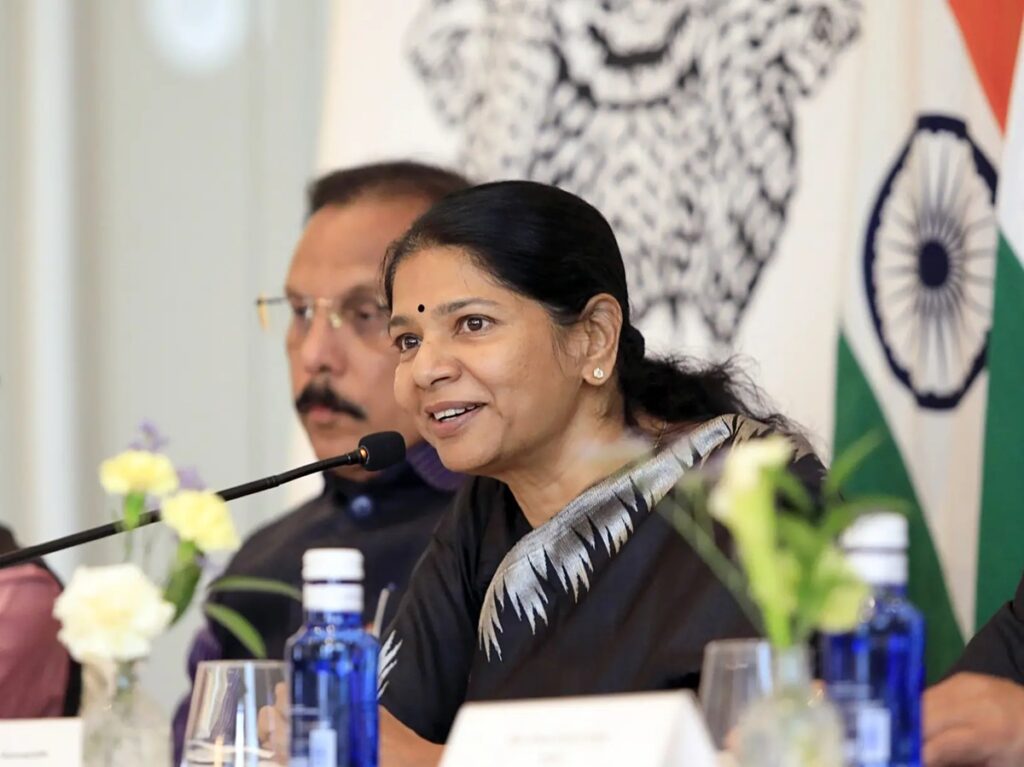DMK MP’s response amid language policy tensions highlights India’s pluralistic identity during a global outreach in Spain.
Madrid: DMK MP Kanimozhi Karunanidhi, leading an all-party delegation in Spain as part of India’s Operation Sindoor outreach, sparked widespread attention on June 3, 2025, with her response to a question about India’s national language. Addressing the Indian diaspora, her statement went viral, reflecting both India’s linguistic complexity and the ongoing domestic debate over language policies.
A Diplomatic Yet Pointed Answer
When asked about India’s national language, Kanimozhi replied, “The national language of India is unity and diversity,” emphasizing that this was the core message her delegation aimed to share globally. Her response, which garnered applause, sidestepped naming a specific language, aligning with India’s constitutional reality—there is no single national language. The Constitution recognizes 22 scheduled languages, including Tamil, Hindi, and Bengali, with Hindi and English as official languages for Union government use. Kanimozhi’s words underscored India’s pluralistic ethos, a stance that resonates deeply amid her party’s resistance to language imposition.
Backdrop of Language Policy Tensions
The DMK has been at the forefront of opposing the Centre’s three-language formula under the National Education Policy (NEP) 2020, which mandates learning Hindi, English, and a regional language. The party, advocating for a two-language policy (Tamil and English), views the NEP as an attempt to impose Hindi, threatening regional languages and federalism. Kanimozhi has accused the BJP-led government of withholding educational funds from Tamil Nadu for resisting the policy, claiming it harms students’ futures. Protests by the DMK, both in Parliament and across Tamil Nadu, highlight the contentious nature of language politics in India.
Global Outreach with a Domestic Message
Kanimozhi’s delegation, which includes MPs from SP, BJP, RJD, AAP, and former diplomats, is part of a five-nation tour to promote India’s zero-tolerance stance on terrorism. In Spain, the final leg of the visit, she also addressed national security, asserting, “We will ensure Kashmir remains a safe place,” amid discussions on terrorism’s global impact. Her language remark, however, stole the spotlight, reflecting India’s internal diversity debates on an international stage. The delegation met Spain’s Foreign Minister Jose Manuel Albares, who expressed support for India’s anti-terrorism efforts, and engaged with the Association of Victims of Terrorism in Madrid.
India’s Linguistic Reality
India’s linguistic diversity—over 1,600 languages and dialects—makes the idea of a single national language impractical and politically charged. The Constitution’s Eighth Schedule lists 22 languages, but none are designated as “national.” Hindi, spoken by about 43% of the population, is often promoted by the central government, sparking resistance in non-Hindi-speaking states like Tamil Nadu. Kanimozhi’s statement aligns with this reality, framing diversity as India’s strength, a message that resonates globally but also challenges the Centre’s language policies.
Conclusion
Kanimozhi’s viral response in Spain not only highlighted India’s unity in diversity but also amplified the DMK’s stance against the three-language policy. As India navigates its complex linguistic landscape, her words serve as a reminder of the need for inclusivity, both at home and abroad, while reinforcing the nation’s pluralistic identity in global forums.


